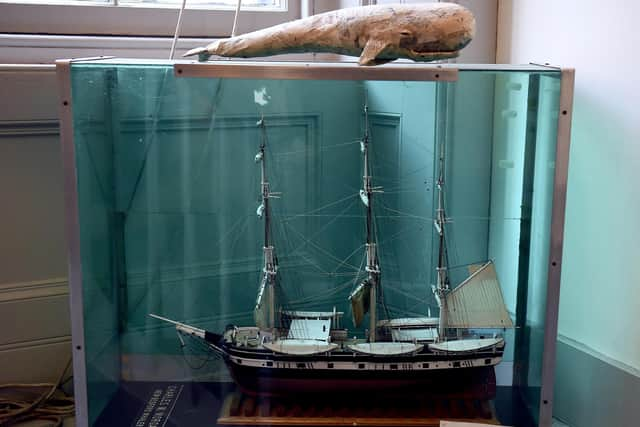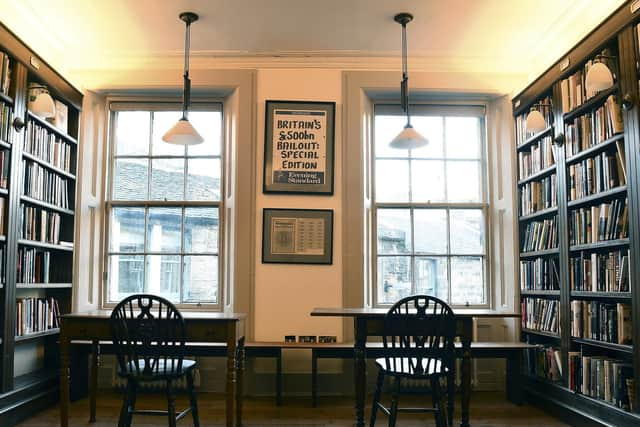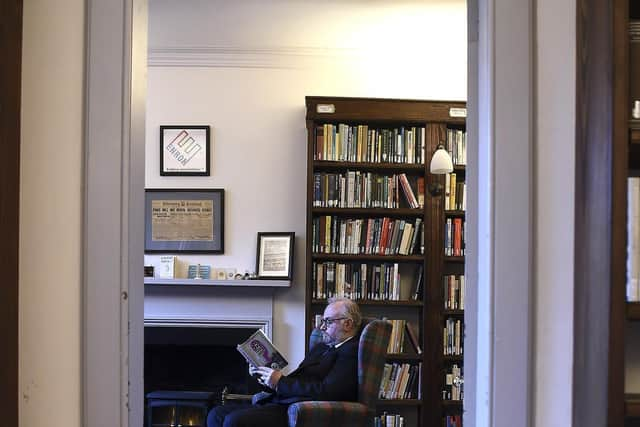From financial crisis to Edinburgh trams - inside the tiny New Town library devoted to mistakes


What does an Edinburgh tram ticket have in common with a model of a fictional 19th century whaling ship?
The answer is that both represent significant mistakes, according to the Keeper of the Library of Mistakes, a small charitably-run library tucked away in the New Town.
Advertisement
Hide AdAdvertisement
Hide AdWhile the delayed and over-budget Edinburgh tram debacle does not quite equal the monumental failure of the Pequod, the 19th century fictional ship of Herman Melville’s Moby Dick which eventually sinks, drowning everyone but the narrator, its inclusion is in line with the rest of the subtle and in many cases slightly cheeky homages to failure housed in the Library of Mistakes.


Opened in April 2014, the Library of Mistakes is designed to encourage and facilitate the study of economic and financial history.
It provides free access to thousands of books around the subject of finance, along with an intricate display of objects alluding to historical mistakes, such as the Edinburgh tram ticket.
The key aims of the library are to educate the public on personal finance and to emphasise the human rather than numerical side of finance and economics.
Advertisement
Hide AdAdvertisement
Hide Ad“Members of the public are increasingly given responsibility for managing their own money,” says Keeper of the library Russell Napier, an investment adviser to global financial institutions.


“And finance is much more than numbers, it’s also about sociology, politics, psychology, history, and so on.”
With its wood-panelled floors, armchairs and fireplace, the Library of Mistakes feels like a serene and oddly calming haven, given the catastrophe documented within its walls.
Access to the library is free, but only by registering as a reader and making an appointment on the website.
Advertisement
Hide AdAdvertisement
Hide AdIt is popular with people planning to invest for their retirement, students, and investment managers, according to Mr Russell.


The visitors book also gleams with comments from delighted tourists from all over the world.
The library is funded by Mr Russell’s financial education charity Didasko, which also runs courses at the University of Edinburgh and the Edinburgh Business School.
A sizeable number of the 3,000-strong collection was donated by Stewart Hamilton, a retiring accountancy professor who sadly died just a few days after the library’s opening in 2014.
Advertisement
Hide AdAdvertisement
Hide AdSince then the collection has continued to grow, often based on readers’ suggestions and donations, and now includes an extra room which opened in June 2019.


The website declares the library to be “changing the world – one mistake at a time", and it already has an outpost at Flame University in Pune, India, and is planning another in Lausanne, Switzerland in the next few months.
“In financial markets, progress is cyclical, not cumulative,” declares a paraphrased quote from business journalist James Grant on the library’s website.
Mr Napier hopes to go some way towards increasing the cumulative nature of progress in finance in the wake of the 2008 crash, which dominates the library’s reading material.
Advertisement
Hide AdAdvertisement
Hide Ad“I’m sad to say that banking is our biggest section,” says Mr Napier.
“There have been so many mistakes, and when banks go bankrupt it affects all of us.”
He hopes to lean towards a more considered, longer-term and better-educated view of finance by popularising its study.
In addition to the reading material, the library also hosts guest lectures, which used to be held on site at Wemyss Place Mews but have now grown so popular they have had to move to larger venues.
Advertisement
Hide AdAdvertisement
Hide AdTitles which shout from the shelves include The Strange Death of Europe, When Money Dies, The Crash, The Edge of Chaos, Crisis Economics, Crisis Investing and Swimming with Sharks.
As well as being the largest, the banking section is also the most dramatic – as might be expected given the devastation wrought by 2008.
There are also a number of books on the current US president.
Mr Napier’s favourite is Trumped! By John O’Donnell, which details Donald Trump’s rise and, to the delight of Mr Napier, his “fall”, as viewed by Mr O’Donnell in 1991.
Advertisement
Hide AdAdvertisement
Hide AdThe items on display along with the books all showcase a similar irony, thoughtfully selected by Mr Napier.
They include a £25 voucher for Jamie’s Italian, which collapsed in May 2019, along with a key fob for British Leyland, whose collapse came 44 years earlier.
A letter posted from Indonesia after the 1997 Asian financial crisis is almost entirely covered in stamps.
Not even the toilet is safe from allusion and display items, as its walls are plastered with notes of different currencies, many of them now worth almost nothing.
Advertisement
Hide AdAdvertisement
Hide AdThe layers of irony contained in each object are enough to delight any visitor, but Mr Napier says he is careful to avoid being too smug about the mistakes of others. “You need to have humility in business and finance,” he says.
“Everyone is trying to predict the future, and everyone will be wrong. It’s just a matter of how wrong you’re going to be.”
Mr Napier hopes the library may go some way towards reducing the fallout from financial mistakes in future.
“People who run banks never seem to learn from their mistakes,” he laments. “We’ll never eradicate mistakes but hopefully we can reduce them – and we won’t prevent another crash but maybe we can reduce the consequences.”
Advertisement
Hide AdAdvertisement
Hide AdMr Napier recognises these are “lofty goals” for a small library comprising three rooms tucked away in a tiny square on the outskirts of Edinburgh’s city centre.
But this too, seems to delight him: “These are almost certainly goals which we will fail to achieve, and that’s perhaps appropriate for the library of mistakes.”